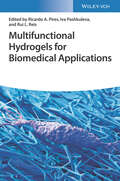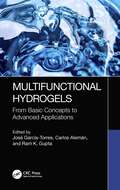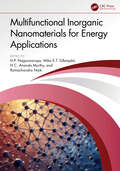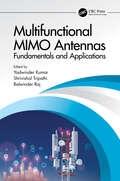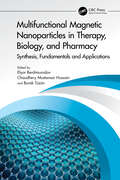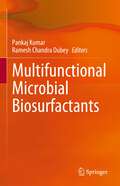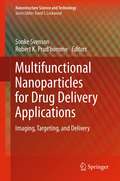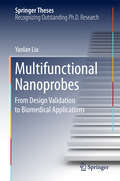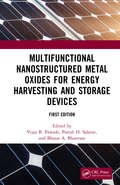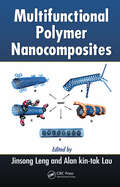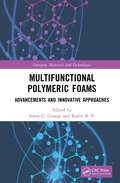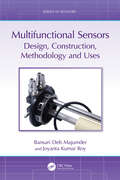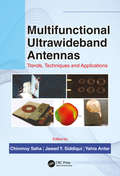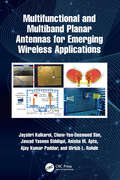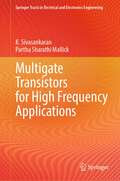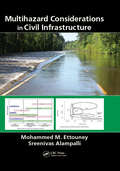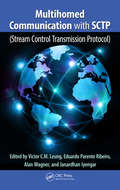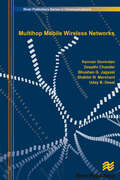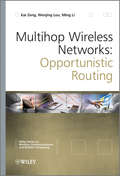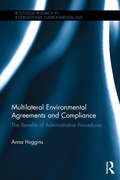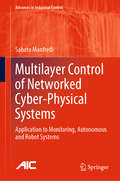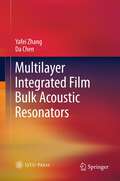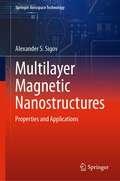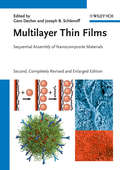- Table View
- List View
Multifunctional Hydrogels for Biomedical Applications
by Rui L. Reis Ricardo A. Pires Iva PashkulevaMultifunctional Hydrogels for Biomedical Applications Comprehensive resource presenting a thorough overview of the biomedical applications of hydrogels This book provides an overview of the development and applications of the clinically relevant hydrogels that are used particularly in tissue engineering, regenerative medicine, and drug delivery. Taking a multidisciplinary approach, it goes through the material from chemistry, materials science, biology, medicine, nanotechnology, and bioengineering points of view. Sample topics covered by the three well-qualified editors include: The design, functions, and developments of hydrogels Proteins and polysaccharides that mimic extracellular matrix Generation and applications of supramolecular hydrogels Design and functions of cell encapsulation systems Multifunctional Hydrogels for Biomedical Applications is a useful all-in-one reference work for materials scientists, polymer chemists, and bioengineers which provides a comprehensive, contemporary understanding of hydrogels and their applications targeting a wide variety of pathologies.
Multifunctional Hydrogels: From Basic Concepts to Advanced Applications
by Carlos Alemán Ram K. Gupta José García-TorresHydrogels are important polymer-based materials with innate fascinating properties and applications: they are three-dimensional, hydrophilic, polymeric networks that can absorb large amounts of water or aqueous fluids and are biocompatible, mechanically flexible, and soft. The incorporation of functionalities to develop smart and bioactive platforms has led to a myriad of applications. This book offers a comprehensive overview of multifunctional hydrogels, covering fundamentals, properties, and advanced applications in a progressive way. While each chapter can be read stand-alone, together they clearly describe the fundamental concepts of design, synthesis, and fabrication, as well as properties and performances of smart multifunctional hydrogels and their advanced applications in the biomedical, environmental, and robotics fields.This book:• Introduces readers to different hydrogel materials and the polymer types used to fabricate them.• Discusses conducting polymer hydrogels, nanocomposite hydrogels, and self-healing hydrogels.• Covers synthesis methodologies and fabrication techniques commonly used to confer certain structures and/or architectures.• Shows how hydrogels can be modified to incorporate new functionalities able to respond to physical and/or chemical changes.• Examines applications including bioelectronics, sensors and biosensors, tissue engineering, drug delivery, antipathogen applications, cancer theranostics, environmental applications, and soft robotics, with chapters showcasing the main advances achieved up to date in every field.Multifunctional Hydrogels: From Basic Concepts to Advanced Applications serves as a valuable resource for academic and industry researchers from interdisciplinary fields including materials science, chemistry, chemical engineering, bioengineering, physics, and pharmaceutical engineering.
Multifunctional Inorganic Nanomaterials for Energy Applications
by H. P. Nagaswarupa Ramachandra Naik Sillanpää, Mika E.T. Murthy, H.C. AnandaMultifunctional Inorganic Nanomaterials for Energy Applications provides deep insight into the role of multifunctional nanomaterials in the field of energy and power generation applications. It mainly focuses on the synthesis, fabrication, design, development, and optimization of novel functional inorganic nanomaterials for energy storage and saving devices. It also covers studies of inorganic electrode materials for supercapacitors, membranes for batteries and fuel cells, and materials for display systems and energy generation.Features: Explores computational and experimental methods of preparing inorganic nanomaterials and their multifunctional applications Includes synthesis and performance analysis of various functional nanomaterials for energy storage and saving applications Reviews current research directions and latest developments in the field of energy materials Discusses importance of computational techniques in designing novel nanomaterials Highlights importance of multifunctional applications of nanomaterials in the energy sector This book is aimed at graduate students and researchers in materials science, electrical engineering, and nanomaterials.
Multifunctional MIMO Antennas: Fundamentals and Applications
by Yadwinder KumarThis book presents a comprehensive approach to antenna designs for various applications, including 5G communication, the internet of things (IoT), and wearable devices. It discusses models, designs, and developments of MIMO antennas, antenna performance measurement, 5G communication challenges and opportunities, and MIMO antennas for LTE/ISM applications. It covers important topics including mmWave antennas, antenna arrays for MIMO applications, reconfigurable/band-notched MIMO antennas, multiband MIMO antennas, wideband MIMO antennas, and fractal-based compact multiband hybrid antennas. FEATURES Discusses antenna design optimization techniques in detail Covers MIMO antenna performance measurement, multiband MIMO antennas, and wideband MIMO antennas Discusses modeling, simulation, and specific absorption rate (SAR) analysis of antennas Provides applications including radio-frequency identification (RFID), wearable antennas, and antennas for IoT Multifunctional MIMO Antennas: Fundamentals and Application is useful for undergraduate and graduate students and academic researchers in areas including electrical engineering, electronics, and communication engineering.
Multifunctional Magnetic Nanoparticles in Therapy, Biology, and Pharmacy: Synthesis, Fundamentals and Applications
by Chaudhery Mustansar Hussain Elyor Berdimurodov Burak TüzünThis definitive guide provides readers with an overview of multifunctional nanoparticles, delving into their novel synthesis methods, unique properties, and diverse applications in therapy, biology, and pharmacy. It also explores techniques for synthesizing magnetic nanoparticles and explains how to tailor nanoparticles with desired traits.Multifunctional Magnetic Nanoparticles in Therapy, Biology, and Pharmacy: Synthesis, Fundamentals and Applications, explores established and emerging techniques for synthesizing magnetic nanoparticles, enabling readers to understand how to tailor-make nanoparticles with desired traits. Beginning with fundamentals, leading experts delve into topics like recent trends in nanoparticle fabrication, magnetic properties, drug delivery systems, imaging, sensing, separation techniques, toxicity mitigation, and commercial applications. The book showcases the transformative impact and future possibilities of multifunctional magnetic nanoparticles in therapy, biology, and pharmacy. It elucidates the fundamentals behind their magnetic properties and interactions, empowering the development of innovative applications. Detailed chapters highlight their utilization in hyperthermia, cancer therapies, separation and detection of biological molecules and cells, as biocatalysts and in bionanotechnology, antimicrobial agents, sensors, and more.This book is written primarily for scientists, researchers, and engineers working in the fields of nanotechnology, materials science, biomedical engineering, and pharmaceutical sciences. The book covers core principles as well as practical applications, which makes it a valuable textbook or training resource across academic and professional settings in this field.
Multifunctional Microbial Biosurfactants
by Pankaj Kumar Ramesh Chandra DubeyThis book provides an overview of biosurfactants as biobased compounds, and highlights novel applications in several industries, including biotech, food processing, cosmetic, oil recovery/petroleum, pharmaceutical, detergent and textile. In the past few decades, biosurfactants have emerged as promising alternative surface-active agents to chemical surfactants due to their high biodegradability, low toxicity, multi-functionality under extreme pH and temperature conditions, long-term physicochemical stability, and their production from renewable sources. This book presents the fundamental aspects (classification, structure, genetics, and properties) of biosurfactants and how their features contribute to the global bioeconomy. Chapters from expert contributors discuss the latest screening, purification and characterization methods of new biosurfactants and biosurfactant-producing fungi and bacteria, including extremophiles. Particular attention is given to the role of biosurfactants in the formulation of sustainable agrochemicals, and their application as eco-friendly mosquitocidal agents, and biopesticides. Readers will discover a perspective on the antiviral activity of biosurfactants, in which the latest in vitro and in silico studies are discussed. Readers will also find more about the foremost therapeutic attributes of biosurfactant-mediated nanoparticles as next-generation drug delivery systems. Given its breadth, this book appeals to a wide readership, from students and academic researchers to scientists and professionals from industry, interested in the study and application of microbial surfactants.
Multifunctional Nanoparticles for Drug Delivery Applications
by Robert K. Prud'Homme Sonke SvensonThis book clearly demonstrates the progression of nanoparticle therapeutics from basic research to applications. This book, unlike others covering nanoparticles used in medical applications, presents the medical challenges that can be reduced or even overcome by recent advances in nanoscale drug delivery. Each chapter highlights recent progress in the design and engineering of select multifunctional nanoparticles with topics covering targeting, imaging, delivery, diagnostics, and therapy.
Multifunctional Nanoprobes
by Yanlan LiuThis thesis mainly focuses on the design and synthesis of novel multifunctional nanoprobes, investigating their feasibility for applications involving sensing, molecular imaging, and the simultaneous diagnosis and therapy of cancer. Above all, it discusses the development of innovative nanomaterials to address the issues limiting the effectiveness of currently available nanoprobes such as the synthesis shortcoming and poor performance in sensing, imaging and therapeutic applications. One of the strengths of this thesis is its integration of knowledge from chemistry, materials science and biomedicine. Further, it presents the theoretical fundamentals in the design of nanoprobes, which can offer guidance for future studies on the development of novel multifunctional nanomaterials with significantly enhanced performance.
Multifunctional Nanostructured Metal Oxides for Energy Harvesting and Storage Devices
by Vijay B. Pawade Bharat A. Bhanvase Paresh H. SalameMetal oxide nanoparticles exhibit potential applications in energy and environmental fields, such as solar cells, fuel cells, hydrogen energy, and energy storage devices. This book covers all points from synthesis, properties, and applications of transition metal oxide nanoparticle materials in energy storage and conversion devices. Aimed at graduate-level students and researchers associated with the energy and environment sector, this book addresses the application of nontoxic and environmentally friendly metal oxide materials for a clean environment and deals with synthesis properties and application metal oxides materials for energy conversion, energy storage, and hydrogen generation.
Multifunctional Polymer Nanocomposites
by Jinsong Leng Alan kin-tak LauThe novel properties of multifunctional polymer nanocomposites make them useful for a broad range of applications in fields as diverse as space exploration, bioengineering, car manufacturing, and organic solar cell development, just to name a few. Presenting an overview of polymer nanocomposites, how they compare with traditional composites, and th
Multifunctional Polymeric Foams: Advancements and Innovative Approaches (Emerging Materials and Technologies)
by Soney C. GeorgePolymeric foams or cellular or expanded polymers have characteristics that makes their usage possible for several industrial and household purposes. This book is focused on the recent advancements in the synthesis of polymer foams, various foaming methods, foaming technology, mechanical and physical properties, and the wide variety of its applications. Divided into 11 chapters, it explains empirical models connecting the geometrical structure of foams with their properties including structure-property relations. This book: Describes functional foams, their manufacturing methods, properties, and applications. Covers various blowing agents, greener methods for foaming, and their emerging applicability. Illustrates comparative information regarding polymeric foams and their recent developments with polymer nanocomposite foams. Includes applications in mechanical, civil, biomedical, food packaging, electronics, health care industry, and acoustics fields. Reviews elastomeric foams and their nanocomposite derivatives. This book is aimed at researchers and graduate students in materials science, mechanical engineering, and polymer science.
Multifunctional Sensors: Design, Construction, Methodology and Uses (Series in Sensors)
by Joyanta Kumar Roy Bansari Deb MajumderThis book provides a detailed overview of multifunctional sensors, covering discussions on different types of multifunctional sensors developed in past years. As a case study, the development of admittance-type multifunctional sensors is provided, constituting its construction, working principles, measurements, and instrumentation used. It also explores a review of the research in the field from 1990 to 2022. It will be a useful resource for researchers of sensor technologies across physics, engineering, and other physical sciences. Key Features • Presents a case study of a multifunctional sensor that measures temperature and level simultaneously. • Discusses latest trends in the area and can be understood by advanced students up to research level scholars. • Looks ahead to the future of these sensors for further research opportunities.
Multifunctional Ultrawideband Antennas: Trends, Techniques and Applications
by Chinmoy Saha Jawad Y Siddiqui Y M AntarMultifunctional Antennas (MFA) are comparatively a new area for antenna research and finds applications in various modern wireless radios, like Cognitive Radio (CR) in Software Defined Radio (SDR) technology and MIMO technology. This book is first attempt and an invaluable resource which deals with the design and realization of various kinds of multifunctional antennas. After clearly explaining the exclusive features of MFAs, the book presents various designs of such antennas considering versatile modern and upcoming applications. <li>Written by three internationally known researchers, Multi-Functional Ultra Wideband Antennas: Trends, Techniques and Applications: <li>Provides a lucid introduction on UWB systems, historical perspective and discusses various applications of such systems <li>Discusses fundamentals of antennas and its characterization in time and frequency domains, primarily aimed for the beginners in the area <li>Revisits the design and realization of various classical UWB antennas <li>Discusses various techniques of designing frequency-notched UWB antennas and provide detailed comparison of the techniques <li>Deals with the techniques of deriving multiple antenna functionalities from a single antenna <li>Incorporates exclusive discussions on modern reconfigurable antennas and printed and dielectric resonator based MIMO antennas with clear focus on recent and upcoming technological requirements <P><P>With Multi-Functional Ultra Wideband Antennas: Trends, Techniques and Applications, antenna engineers, communication system engineers, graduate students, academic/industry researchers will gain a thorough knowledge on design of such antennas with clear physical insight and understanding. <P><P> Chinmoy Saha, PHD, is an associate Professor in the Department of Avionics at Indian Institute of Space Science and Technology, Thiruvananthapuram, Kerala, India. His current research interest includes Microwave Circuits, Engineered Materials, Metamaterial Inspired Antennas and Circuits, reconfigurable and multi-functional antennas for modern wireless applications, Dielectric Resonator antennas, THz antennas and wireless power transfer. He is the author or coauthor of several books, scientific journals and recipient of several prestigious awards. Jawad Yaseen Siddiqui, PHD, is an associate Professor in the Department of Radio Physics and Electronics at University of Calcutta, Kolkata, India. His current research interest includes ultra-wideband antennas, frequency reconfigurable antennas, tapered slot antennas and multi-functional antennas for cognitive radio application. He is the author or coauthor of several books, scientific journals and recipient of prestigious awards. He is a Co-Principal Investigator on Stratosphere Troposphere (ST) Radar Project at the University of Calcutta, Kolkata, India. Yahia M.M. Antar, PHD, is a Professor in the Department of Department of Electrical and Computer Engineering at the Royal Military College of Canada, Kingston, ON, Canada. He is the author or coauthor of several books, scientific journals and recipient of prestigious awards which includes IEEE-Antennas and Propagation Society prestigious Chen-To-Tai Distinguished Educator Award for 2017, 2015 IEEE Canada J. M. Ham outstanding Engineering Education Award, 2014 IEEE Canada RA Fessenden Silver Medal, 2012 Queen’s Diamond Jubilee Medal from the Governor General of Canada and many more.
Multifunctional and Multiband Planar Antennas for Emerging Wireless Applications
by Ulrich L. Rohde Jayshri Kulkarni Chow-Yen-Desmond Sim Jawad Yaseen Siddiqui Anisha M. Apte Ajay Kumar PoddarThis work focuses on designing multiband-printed single/Multiple Input Multiple Output (MIMO) CP antennas for WLAN/V2X and NR Sub-6GHz 5G applications. It also delves into the design and implementation of a Four-Port MIMO antenna for wireless applications, addressing theoretical foundations and challenges. Additionally, the book explores critical aspects of software-defined radios (SDR), including modulation, signal processing, radio systems, TX/RX blocks, SDR-enabled phased arrays, and beam hopping techniques, with relevance to 5G, 6G, and IoT applications. Features: • Explores advancements in planar monopole antennas, including bandwidth enhancement techniques. • Analyzes innovative antenna design structures, like miniaturized and conformal monopole antennas; and discusses modeling and implementation. • Spotlights WLAN and Wi-Fi 6/6E antenna design for next-gen laptops with practical insights. • Addresses the use of triple-band antenna arrays for MIMO applications in laptops.• Focuses on planar antenna advancements for diverse wireless bands and applications. • Explores multiband-printed single/MIMO CP antennas for WLAN/V2X and NR Sub-6GHz 5G. • Covers the design and implementation of a Four-Port MIMO antenna for wireless applications, including theoretical foundations and challenges. • Explores SDR, modulation, signal processing, radio systems, TX/RX blocks, SDR-enabled phased arrays, and beam hopping techniques for 5G, 6G, and IoT applications. This book is aimed at graduate students and researchers in electrical and electronic engineering, antennas, and wireless communication systems.
Multigate Transistors for High Frequency Applications (Springer Tracts in Electrical and Electronics Engineering)
by Partha Sharathi Mallick K. SivasankaranThis book discusses the evolution of multigate transistors, the design challenges of transistors for high-frequency applications, and the design and modeling of multigate transistors for high-frequency applications. The contents particularly focus on the cut-off frequency and maximum oscillation frequency of different multigate structures. RF stability modeling for multigate transistors is presented, which can help to understand the relation between the small-signal parameter and the physical parameter of the device for optimization. This is a useful reference to those in academia and industry.
Multihazard Considerations in Civil Infrastructure (Civil Infrastructure Health and Sustainability)
by Sreenivas Alampalli Mohammed M. EttouneyThis book explains and presents the need for Multihazard Consideration (MH) in the management of civil infrastructure, what constitutes MH, and how to address MH in design and analysis. A generalized theory of MH will serve as the basis of the objective treatment of this volume. Use of MH in bridge management (inspection, maintenance, rehabilitation, and replacement) will serve as the basis for several examples, and numerous case studies will be presented throughout.
Multihomed Communication with SCTP (Stream Control Transmission Protocol)
by Victor C.M. Leung Alan Wagner Janardhan Iyengar Eduardo Parente RibeiroAlthough multihomed communication is a rapidly emerging trend for next generation networks, no known book explores multihomed communication with the Stream Control Transmission Protocol (SCTP). Filling this void, Multihomed Communication with SCTP (Stream Control Transmission Protocol) explains this innovative feature that allows an endpoint to sim
Multihop Mobile Wireless Networks
by Kannan Govindan Deepthi Chander Bhushan G. JagyasiMultihop Mobile Wireless Networks discusses issues pertaining to each of these networks and proposes novel and innovative algorithms on Scheduling, Routing and Data aggregation that are viable solutions for multihop mobile networks.
Multihop Wireless Networks
by Ming Li Kai Zeng Wenjing LouThis book provides an introduction to opportunistic routing an emerging technology designed to improve the packet forwarding reliability, network capacity and energy efficiency of multihop wireless networksThis book presents a comprehensive background to the technological challenges lying behind opportunistic routing. The authors cover many fundamental research issues for this new concept, including the basic principles, performance limit and performance improvement of opportunistic routing compared to traditional routing, energy efficiency and distributed opportunistic routing protocol design, geographic opportunistic routing, opportunistic broadcasting, and security issues associated with opportunistic routing, etc. Furthermore, the authors discuss technologies such as multi-rate, multi-channel, multi-radio wireless communications, energy detection, channel measurement, etc. The book brings together all the new results on this topic in a systematic, coherent and unified presentation and provides a much needed comprehensive introduction to this topic.Key Features:Addresses opportunistic routing, an emerging technology designed to improve the packet forwarding reliability, network capacity and energy efficiency of multihop wireless networksDiscusses the technological challenges lying behind this new technology, and covers a wide range of practical implementation issuesExplores many fundamental research issues for this new concept, including the basic principles of opportunistic routing, performance limits and performance improvement, and compares them to traditional routing (e.g. energy efficiency and distributed opportunistic routing protocol design, broadcasting, and security issues)Covers technologies such as multi-rate, multi-channel, multi-radio wireless communications, energy detection, channel measurement, etc.This book provides an invaluable reference for researchers working in the field of wireless networks and wireless communications, and Wireless professionals. Graduate students will also find this book of interest.
Multilateral Environmental Agreements and Compliance: The Benefits of Administrative Procedures (Routledge Research in International Environmental Law)
by Anna HugginsThe adoption of administrative procedures in global governance has the potential to foster proper consideration of marginalized actors’ interests, yet risks entrenching the dominance of the well-resourced and powerful. Accordingly, this book proposes a new framework for evaluating the extent to which administrative procedures in the compliance systems of multilateral environmental agreements constrain power and promote regard for the interests of affected states, which are frequently developing and transition countries. This framework is applied to the compliance systems under the Montreal Protocol, the Kyoto Protocol and CITES, which address critical global environmental issues of ozone-layer depletion, climate change and trade in endangered species, respectively. The analysis shows that, under certain conditions, administrative procedures limit the influence of states’ asymmetric power on compliance deliberations. Furthermore, systematic adoption of these procedures increases the opportunities for affected states’ interests to be voiced and considered in compliance decision-making processes.
Multilayer Control of Networked Cyber-Physical Systems
by Sabato ManfrediThis book faces the interdisciplinary challenge of formulating performance-assessing design approaches for networked cyber-physical systems (NCPSs). Its novel distributed multilayer cooperative control deals simultaneously with communication-network and control performance required for the network and application layers of an NCPS respectively. Practically, it distributes the computational burden among different devices, which act cooperatively to achieve NCPS goals. The approach can be applied to NCPSs based on both wired and wireless technologies and so is suitable for future network infrastructures in which different protocols and technologies coexist. The book reports realistic results from performance evaluation of the new approach, when applied in different operative scenarios. Readers of this book will benefit by: learning a general, technology-independent methodology for the design and implementation of cooperative distributed algorithms for flow control at the network layer of an NCPS that gives algorithm-parameter-tuning guidelines for assessing the desired quality of service performance; learning a general methodology for the design and implementation of consensus-based algorithms at the application layer that allows monitoring and control of distributed physical systems and gives algorithm-parameter-tuning guidelines for assessing the desired control system performance; understanding the main network simulators needed to validate the effectiveness of the proposed multilayer control approach in different realistic network operation scenarios; and practising with a cooperative multilayer control project that assesses acceptable NCPS performance in networked monitoring and robot systems, autonomous and queuing networks, and other critical human relief applications. Researchers, graduate students and practitioners working in automation, engineering, sensor networks, mobile robotics and computer networks will find this book instructive. It will also be helpful to network administrators and technicians implementing application-layer and network-layer solutions or installing, configuring or troubleshooting network and control system components of NCPSs.
Multilayer Control of Networked Cyber-Physical Systems: Application to Monitoring, Autonomous and Robot Systems (Advances in Industrial Control)
by Sabato ManfrediThis book faces the interdisciplinary challenge of formulating performance-assessing design approaches for networked cyber-physical systems (NCPSs). Its novel distributed multilayer cooperative control deals simultaneously with communication-network and control performance required for the network and application layers of an NCPS respectively. Practically, it distributes the computational burden among different devices, which act cooperatively to achieve NCPS goals. The approach can be applied to NCPSs based on both wired and wireless technologies and so is suitable for future network infrastructures in which different protocols and technologies coexist. The book reports realistic results from performance evaluation of the new approach, when applied in different operative scenarios. Readers of this book will benefit by: learning a general, technology-independent methodology for the design and implementation of cooperative distributed algorithms for flow control at the network layer of an NCPS that gives algorithm-parameter-tuning guidelines for assessing the desired quality of service performance; learning a general methodology for the design and implementation of consensus-based algorithms at the application layer that allows monitoring and control of distributed physical systems and gives algorithm-parameter-tuning guidelines for assessing the desired control system performance; understanding the main network simulators needed to validate the effectiveness of the proposed multilayer control approach in different realistic network operation scenarios; and practising with a cooperative multilayer control project that assesses acceptable NCPS performance in networked monitoring and robot systems, autonomous and queuing networks, and other critical human relief applications. Researchers, graduate students and practitioners working in automation, engineering, sensor networks, mobile robotics and computer networks will find this book instructive. It will also be helpful to network administrators and technicians implementing application-layer and network-layer solutions or installing, configuring or troubleshooting network and control system components of NCPSs.
Multilayer Integrated Film Bulk Acoustic Resonators
by Da Chen Yafei ZhangMulilayer Integrated Film Bulk Acoustic Resonators mainly introduces the theory, design, fabrication technology and application of a recently developed new type of device, multilayer integrated film bulk acoustic resonators, at the micro and nano scale involving microelectronic devices, integrated circuits, optical devices, sensors and actuators, acoustic resonators, micro-nano manufacturing, multilayer integration, device theory and design principles, etc. These devices can work at very high frequencies by using the newly developed theory, design, and fabrication technology of nano and micro devices. Readers in fields of IC, electronic devices, sensors, materials, and films etc. will benefit from this book by learning the detailed fundamentals and potential applications of these advanced devices. Prof. Yafei Zhang is the director of the Ministry of Education's Key Laboratory for Thin Films and Microfabrication Technology, PRC; Dr. Da Chen was a PhD student in Prof. Yafei Zhang's research group.
Multilayer Magnetic Nanostructures: Properties and Applications (Springer Aerospace Technology)
by Alexander S. SigovThis book presents relevant issues for the development of computer technology in general and civil aviation in particular, related to the promising task of developing magnetoresistive memory. In modern conditions of constantly increasing air traffic intensity, it is necessary to use both on board the aircraft and in ground services computing devices that guarantee the required level of flight safety. The book shows that in the multilayer ferromagnet-antiferromagnet system, the behavior of magnetic parameters in layers of nanometer thickness is largely determined by frustrations. The monograph provides not only a complete analysis of the current state of magnetic nanostructures but also predicts new types generated by exchange interaction frustrations. The phase diagrams "layer thickness (layers)—roughness" of a thin ferromagnetic film on an antiferromagnetic substrate and a spin-valve system ferromagnet-antiferromagnet-ferromagnet are constructed taking into account the energy of single-ion anisotropy. The book presents experimental results that confirm the existence of a new type of domain walls. It is shown that the detected domain walls appear exactly at the locations of the atomic steps, and their thickness increases in proportion to the film thickness with a proportionality coefficient of the order of one. Special attention using mathematical models is placed for optimal orientation of spins at a smooth interface in the case of a compensated cross section of an antiferromagnet and an uncompensated cross section. The constructed phase diagrams and models are compared with the experiments. It is thus concluded that scanning tunneling microscopy (STM) makes it possible to study domain walls generated by frustration on the surface of the structure.
Multilayer Thin Films: Sequential Assembly of Nanocomposite Materials
by Gero Decher Joseph B. SchlenoffThis second, comprehensive edition of the pioneering book in this fi eld has been completely revised and extended, now stretching to two volumes. The result is a comprehensive summary of layer-by-layer assembled, truly hybrid nanomaterials and thin fi lms, covering organic, inorganic, colloidal, macromolecular, and biological components, as well as the assembly of nanoscale fi lms derived from them on surfaces. These two volumes are essential for anyone working in the field, as well as scientists and researchers active in materials development, who needs the key knowledge provided herein for linking the field of molecular self-assembly with the bio- and materials sciences.
